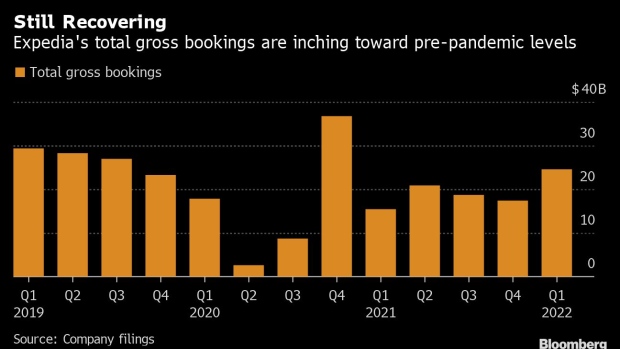May 2, 2022
Expedia Results Are in Line as Omicron Weighs on Pent-Up Demand
, Bloomberg News

(Bloomberg) -- Expedia Inc. reported revenue in the first quarter that was in line with analysts’ estimates, hampered by lingering effects of the Covid-19 omicron variant, but executives expressed optimism for a strong summer travel season.
Revenue rose 80% to $2.25 billion, according to a statement from the Bellevue, Washington-based company. Expedia reported a loss of 47 cents a share, excluding some costs, while analysts were predicting a loss of 43 cents.
“As we have seen many times during Covid, this quarter was a tale of two stories,” said Chief Executive Officer Peter Kern. “There was early impact from omicron left over from late last year, which faded as the turnaround in demand reached new highs since the start of Covid. While the war in Ukraine did slow some of the recovery in Europe, there too we see travel at new highs since the start of the pandemic.”
Travel executives are betting that this summer will be one of the busiest yet as consumers excited to leave home will splurge on vacations -- potentially going further afield and venturing back into tourist hot spots. Some signs of strong demand are already emerging in the industry, with airlines such as United Airlines Holdings Inc. boosting capacity for transatlantic flights and Southwest Airlines Co. saying they expect to be profitable for the remaining three quarters of the year, even with oil prices well over $100 a barrel.
The vision of one of the best summers on record was blurry in the beginning of the year — with the spread of the omicron variant peaking in January and the start of the war in Ukraine a month later. Still, Kern said in a February interview that the highly contagious Covid-19 variant “burned bright and fast” and that the company has been able to adapt to new virus challenges. Other travel executives have said that the war in Ukraine hasn’t changed consumer behavior outside of that region, a positive sign that tourism to Western Europe will remain strong this summer. Expedia gets three-quarters its revenue from the U.S. and has limited exposure to Russia and Ukraine.
Expedia, which hosts reservations for traditional lodging like hotels and short-term rentals on its Vrbo platform, and provides access to pricing for airlines, hotels and car rental companies, reported gross bookings of $24.4 billion, compared with estimates of $24.5 billion.
The company has benefited from offering accommodations in hotels as well as alternative lodging, since people who can work from anywhere fled to remote short-term rentals during the pandemic. Now tourists are starting to return to traditional vacation hotspots like New York. Vrbo specializes in whole-home vacation rentals, while rival Airbnb Inc. holds the lion’s share of urban apartment rentals.
Vacation homes are continuing to hold their ground as the most popular type of lodging after hotels, according to an April survey from Cowen Inc. analyst Kevin Kopelman.
The shares were up about 2% in extended trading after closing at $174.81 in New York. They have declined about 3.3% this year, compared with an 8.2% decline for Airbnb Inc. and 8.6%% for Bookings Holdings Inc.
©2022 Bloomberg L.P.


